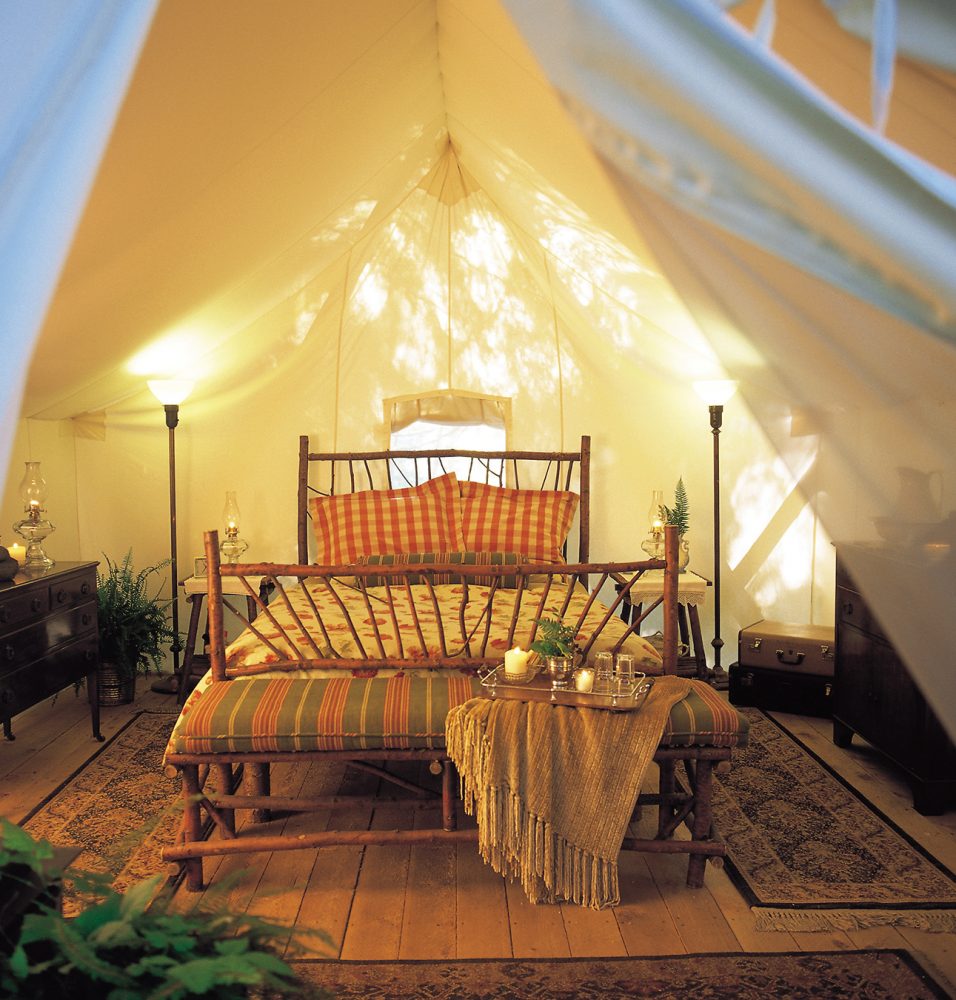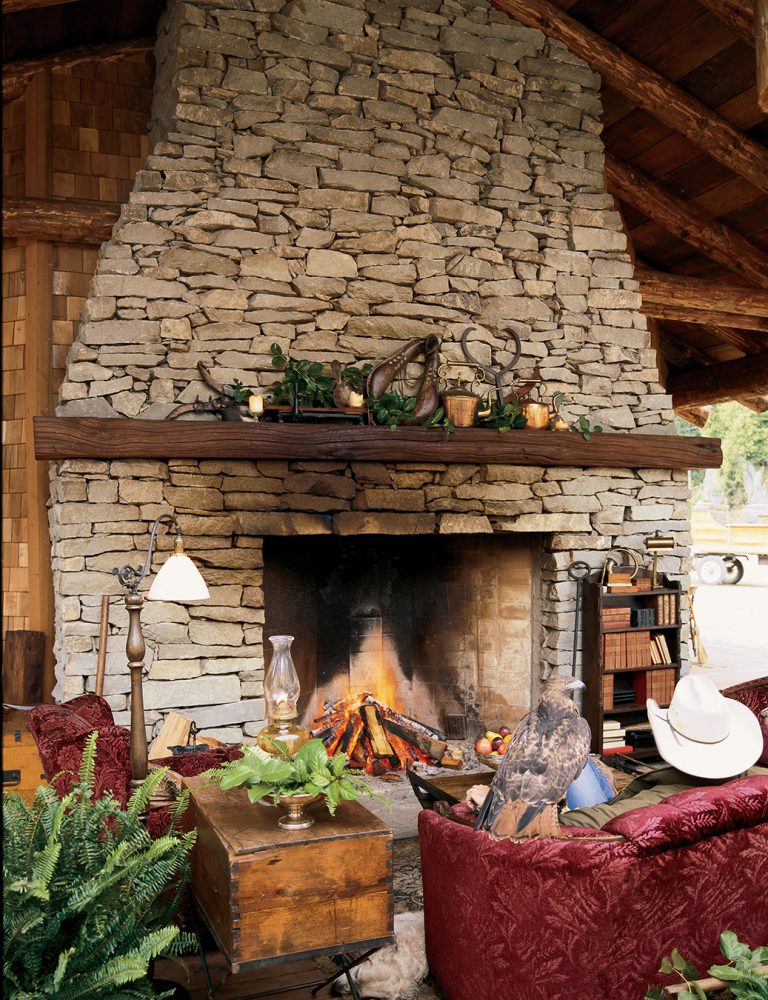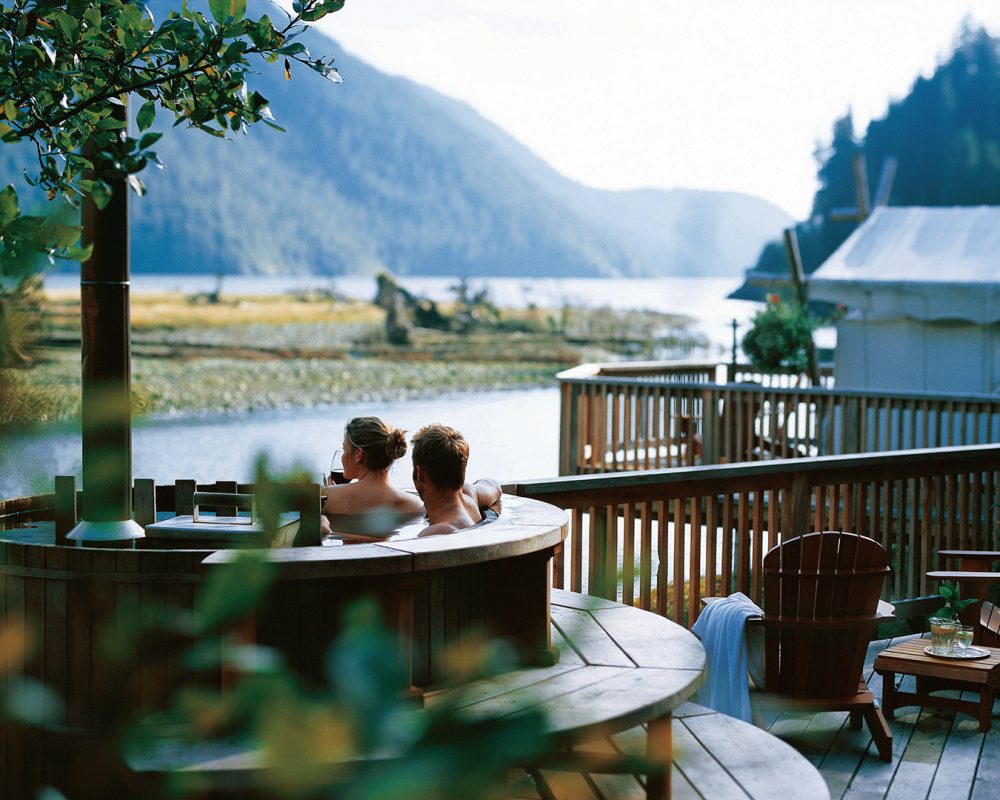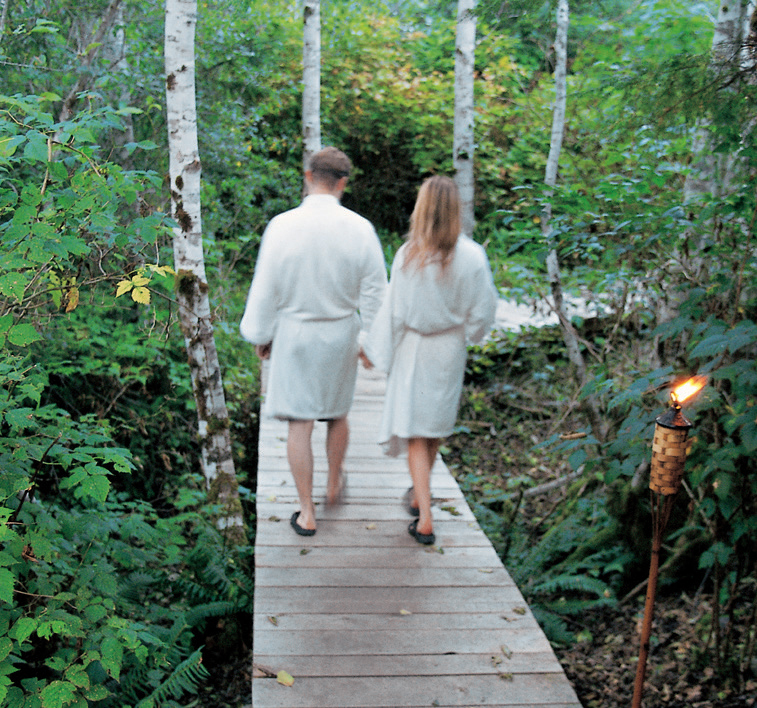One of Europe’s tabloids hunted high and low for Denmark’s Prince Joachim and Princess Marie after their 2008 wedding. I knew where they were; they were honeymooning in a tent not far from mine at the Clayoquot Wilderness Resort.
Perhaps like me, they had their sights set on raw wilderness. How wild did they want it? Wild, but not that wild? Exotic, remote, yet cushioned with down-filled creature comforts? Obviously we both decided to try “glamping”, where glamour meets camping, under a starry sky marked only by a chandelier. Instead of “boggy pup tent,” we found spacious white canvas safari-style tents with Persian rugs on polished wood floors. Meals from a Coleman stove? Not a chance. The chef is a pro, the silver is polished, the linen is crisp.
This is luxury camping, eco-style, on the west coast of Vancouver Island at the Clayoquot Wilderness Resort in B.C.’s first UNESCO Biosphere Reserve, Clayoquot Sound, often described as an “upside-down rainforest”. It’s a spectacular 350,000-hectare maze of inlets and islands and is the best and largest intact example of temperate rainforest left in the world. It’s only accessible through either a 45-minute boat ride from the fishing village of Tofino or by floatplane from Vancouver. I’m welcomed at the dock by John “Cowboy” Caton and his charming wife, Adele, in a pioneer wagon pulled by two draft horses, Pete and Poke.
The first thing I notice are tents on raised wooden platforms connected by cedar boardwalks that traverse the rainforest and river estuary. The tents have furnished decks overlooking the Sound, and I unzip the flaps to reveal queen-size Adirondack-style beds with goose-down duvets, antique dressers, remote-controlled propane woodstoves, oil lamps and opulent Persian rugs. There are fresh wild flowers in a vase, and a bathrobe. At night, flickering candles transform the outdoor areas while flaming torches light up the boardwalk.
With the expertise of guides, guests can spend their days river and ocean kayaking, canoeing, biking, hiking, fresh and saltwater fishing and bear- and whale-watching.
At the centre of this resort is Executive Chef Tim May’s 3,000-square-foot cedar-and-fieldstone cookhouse, where I help myself to the well-stocked bar, fresh fruit baskets and cookie jars. Chef May calls his food “ultra-luxury” and prides himself on using sustainable, seasonal products from Vancouver Island growers, artisan producers, foragers and local fishermen. A five-course menu includes Cowichan Farms duck breast, Dungeness crab, wild salmon, grilled oyster mushrooms and local organic greens. For those who prefer “cowboy cuisine”, May whips up beef stew, chicken pot pie, macaroni and cheese and burgers. The wine list sports the best wines from the Pacific Northwest including some hard-to-find gems from the Okanagan Valley. After dinner, Champagne or snifters of cognac can be sipped under the stars while lounging in front of the majestic fireplace. “After their stay,” says John Caton, “many guests send us photos of their newly created ‘outside living room’.”
John and Adele Caton started the Clayoquot Wilderness Resort in 1997 after John’s life-threatening health crisis. John was a music mogul in the eighties travelling around the world for Warner Bros. discovering artists and managing such Canadian legends as Blue Rodeo and Prairie Oyster. Along with the glamour and high stakes came late nights and long days. In 1989, at the age of 39, he suffered a heart attack. Overweight, with an inoperable hole in his heart, a substance abuse problem and a life out of control, he opted for a healthier lifestyle. John, Adele and their two sons relocated to Vancouver Island, secured financial backing and started the resort with five tents. They now have 20, and their staff includes horse wranglers, boat skippers, specialist tour guides and fishing experts, who all work an intensive eight-month season from March until October.
There are miles of trails and old logging roads through the old-growth forest to explore on horseback, as well as ghost towns and stream-fed meadows. Bears, eagles, whales, seals, sea lions and deer are frequently sighted. B.C. has about one-quarter of all the bears in Canada, so I read the Safety Guide To Bears In The Wild I find in my tent. Although 20 well-trained dogs at Clayoquot earn their keep by chasing the bears away, I plan to make my presence known by talking loudly, clapping, wearing bells or doing all of the above. I don’t want to surprise a bear.
There are miles of trails and old logging roads through the old-growth forest to explore on horseback, as well as ghost towns and stream-fed meadows.
With the expertise of guides, guests can spend their days river and ocean kayaking, canoeing, biking, hiking, fresh and saltwater fishing and bear- and whale-watching. New this season is the Mokai, a motorized kayak that allows you to experience heightened wildlife-viewing opportunities such as keeping up with the whales. Other activities include archery, rock climbing, mountain biking, swimming, sailing, scuba diving and skeet shooting.
After playing hard, guests’ aching muscles are rubbed, soaked and eased in tents and massage platforms cantilevered over the Bedwell River estuary at the Healing Grounds. Spa treatments are matched with activities: for rock climbers, a manicure; for horseback riders, a saltwater bath soak; and for fishers, a deep massage. There’s even the ultimate indulgence for men: straight razor shaves. Wood-fired hot tubs are located throughout the resort. Each morning, there are yoga and tai chi classes at the yoga and fitness centre.
I was impressed to hear that a percentage of the resort’s package rates go to the non-profit British Columbia Wilderness Tourism Association. The Catons strive to remain in the top echelon of sustainable properties in the world. They have a comprehensive recycling program, organic gardens, gravity-fed turbines that generate fuel-less electricity and hot water, a waste composting system and a policy of non-intrusive, conservancy-driven marine and land adventures for guests. This includes a five-year, $3-million plan to restore 6.4 kilometres of critical salmon-spawning habitats. They have initiated programs for bear mapping, recording whale acoustics, and raptor rehabilitation. “Once I’m finished cleaning up my own backyard, I plan to be a thorn in the side of Canadian politicians, and will campaign to have rivers cleaned up elsewhere,” says John.
Behind the tent flaps, the Catons’ activism, creativity and hospitality is attracting not only royalty but celebrities, CEOs and glamping enthusiasts who want an eco-friendly experience at no cost to nature.












